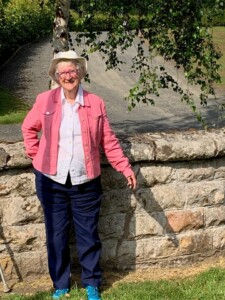
Judy Kirby
Isabel Walker remembers an inspirational colleague: Former MJA member Judy Kirby, who died after a sudden illness in early June, aged 84, taught me one of the best lessons I have ever learned in my professional life as a writer and editor.
I had joined the staff of General Practitioner as a reporter in 1977. Judy was the News Editor and my immediate boss. I was still at that early stage of my career where you agonise over every word in an article, and try out various versions of an intro before committing, in the process wasting a great deal of time and running up against deadlines.
When I asked Judy for advice, she treated me to one of her characteristic eye rolls and said, with mild irritation, ‘Izzy, just fucking get on with it.’
Start writing
So, I did. It is a lesson all writers need to learn. The best way to start an article is just to… start writing. It might seem like you’re producing rubbish at first, but just keep going and eventually you will hit your stride. Then go back to the beginning and start revising and improving. Invariably you find the first attempt is not nearly as bad as you had thought, and the editing process goes smoothly and swiftly.
It’s a principle I have followed throughout my writing career. I passed it onto other writers during various stints as an editor and to my two children when they were struggling with essays and dissertation (well maybe without the swear word). And I owe it all to Judy.
East End family
Born in 1940, Judy was the youngest child – by a long way – of a very large East End family. When she was just a baby, the family was bombed out of their street in Plaistow and spent weeks in a park shelter, before finding a new home in neighbouring East Ham. She often told the story of how her father had to creep past the soldiers guarding the old property, which housed an unexploded bomb, to retrieve essentials such as Marmite and marge’ from the house.
Judy’s schooldays were not the happiest: unsurprising given that the less-than-inclusive motto of her secondary school was ‘the woods would indeed be silent if only those birds sang who sang the best’! She often said that her real education was five years of psychoanalysis, which unleashed her characteristic emotional intelligence and honesty.
Meticulous craft
Judy’s meticulous craft and no-nonsense approach were honed in the traditional training grounds of local newspapers and Fleet Street. After leaving school, she started work as a reporter on her local newspaper the Stratford Express. She then worked her way through news agencies and a regional newspaper to the then highly regarded and influential London Evening Standard, where she remained as a news reporter for eight years.
After a short stint as a TV researcher, Judy branched into medical journalism, first as News Editor of the then leading doctors’ weekly General Practitioner, where I met her 47 years ago, and later as a freelance writer for national newspapers and magazines, including Saga, where she served as Medical Editor for many years.
Her years of writing for consumer outlets gave her an ability to explain and simplify complex issues, which was a real gift when it came to medical writing. It mattered little that she was not a scientist: she instinctively knew how to craft an article so that it could be widely understood, and coach other writers to achieve the same results.
Working as a freelance made it possible for Judy to move away from London, and in 1989 she relocated to Wooler, a small Northern town that sits on the edge of the Northumberland National Park. This is where she found a community of like-minded people and settled happily for the rest of her life.



I am so very sad to hear of the death of Judy Kirby. Although our paths never crossed on the Stratford Express we worked together on the Evening Standard for many years. She was already there when I joined in 1968. There were just four of us female news reporters in those days and as well as working hard we had great fun together. I remember staying with her in her flat in South Woodford. She was a guest at my wedding in 1980 and at my leaving party from the Daily Mirror in 2004. Although I saw her less when she moved “up north” – the last time at an Evening Standard reunion party in 2017 – we still kept in touch by phone and email.
One outstanding memory was her wanting a wreath in the shape of a bottle of Guinness when her mother died but the undertaker refused, saying it was in bad taste.
I joined General Practitioner a couple of years after Izzy as a trainee reporter after experiencing Haymarket Publishing’s one and only attempt at a graduate training programme. Like most of my fellow students on the programme I really wanted to work on Campaign, which was looked on as the glamour-mag in Haymarket’s stable of publications, with access all floors to the glitzy world of advertising.
My disappointment at being allocated to GP was tempered only by being told that the alternative was a post on Newsagent & Confectioner. The editor of GP wasn’t too keen on having two trainees on his paper (one of my fellow students had joined the subs desk and he didn’t want another) but his budget was upped to provide for me. So I arrived at the Dean Street office for my first day, a tad short on enthusiasm for a career in medical journalism. Then I met Judy and she wiped my slate clean and started me all over again. My first news editor in my first job as a reporter and she laid the foundations for a career that has taken me to the far corners of the world and back again.
I remember her looking at one of my first efforts with a gimlet eye and remarking “Ask yourself, Peter, is this story sexy?” I had no idea what she meant. This was a doctors’ newspaper not a Fleet Street tabloid. She spiked quite a few of my attempts after that or had a sub rewrite them but I got it in the end. I still find myself saying quietly when reviewing a piece “So is this story sexy?”
When she went freelance and I became Features Editor on GP I repaid the debt as best as I could commissioning articles from her. Later when I moved into healthcare PR I carried on commissioning conference coverage, feature articles and reports for my client companies. She was a complete professional from a time when they made them well, but more than that, a great woman and I loved her to bits. Rest easy, mate.
Further to Isabel’s comments, I’d like to add some further information about her life.
In the 1990s, Judy started to attend Quaker meetings, attracted by its calm, its openness to other faiths and its commitment to peacebuilding, equality, sustainability and truthfulness (PEST). She became very active in Quaker affairs and for several years edited The Friend, the Quakers’ long-standing national weekly magazine.
But editing alone was never enough for Judy. She was always bursting with ideas – for interviews, articles and books. In 2007 she published Afternoons with Galen, a typically quirky tale about a health journalist who turns over her regular column to the 2nd century Greek physician Galen, cuing up a battle between modern medicine and ancient wisdom. She also wrote a book called Work after work’, about the voluntary opportunities open to executives post-retirement
A few years ago, Judy contracted a serious spinal inflammatory condition after a bout of shingles. Despite excellent care, intensive rehab and her own strenuous efforts, she only ever made a partial recovery. Last year she suffered a serious setback that required her to spend some time in respite care. But, fiercely independent to the last, she was determined to get back to her own home, and she succeeded.
She carried on writing and reporting to the end, among other things producing articles for the local newsletter Glendale Live.
Judy was a one-off: she was a great supportive and empathetic friend to her younger colleagues at GP, and in many cases those friendships have endured for decades. A typical remark made in her last week to a friend concerned about a difficult relationship was: ‘be kind’.
Endlessly modest and self-deprecating, Judy was nonetheless a deep thinker, who always had interesting and original ideas to share.
There was an Eeyore-ish quality to Judy, which sometimes weighed her down. But she had such a strong sense of humour that she could easily be teased out of her glooms. She will be missed greatly by all who knew, loved and appreciated her.
Tribute from Jane McIntyre
Hello, I’ve just heard, by chance, about the death of Judy Kirby, and read some of the lovely tributes from former colleagues with whom I also worked. Like Izzy, I joined GP in 1977–but straight from a one year journalism course at the LCP: an absolute beginner. Inspite of that, I was raring to go, and proud of the exclusives I managed to find, and craft, with the help of the experienced journalists around me. With Judy’s desk just to my right, and a clattering, ‘sit up and beg’ typewriter… I was aware that she’d know the moment I stopped typing. I swear she’d count to ten before leaning forward, winking at me, and telling me to ‘f***ing bash it out, love’. A few years later I joined the BBC, where I spent a whole career ‘f***ing bashing it out’ at top speed….to avoid missing my own news bulletins. Judy was kind, funny, brilliant: razor sharp, but soft as anything if you needed help.